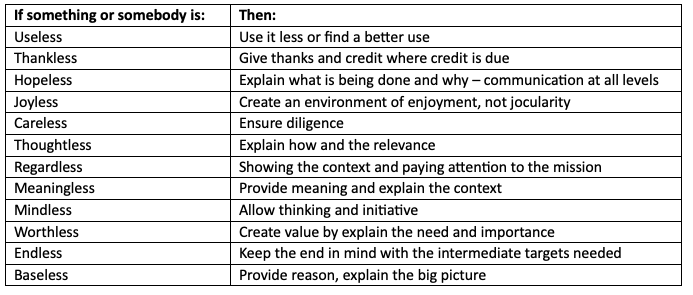 In today’s so called “Modern Era” with more people on the planet than ever before we seem to have less and less time. Despite living in the “Information Age” where data and instant knowledge are readily available at the touch of a button, swipe on a touch screen, or even a voice command time fritters away. There’s the ubiquitous smart ‘phone, the Internet and related search engines, remote meeting media, self-help and self-improvement podcasts and now, AI with free ChatGPT which are all meant to help.
In today’s so called “Modern Era” with more people on the planet than ever before we seem to have less and less time. Despite living in the “Information Age” where data and instant knowledge are readily available at the touch of a button, swipe on a touch screen, or even a voice command time fritters away. There’s the ubiquitous smart ‘phone, the Internet and related search engines, remote meeting media, self-help and self-improvement podcasts and now, AI with free ChatGPT which are all meant to help.
With all of these tools at our disposal comes the expectation that more productivity can be achieved with better quality, reduced costs and of course, in less time. Unfortunately, time cannot be stored. It’s often wasted, and people often take their own sweet time at the expense of others. When people take more than their fair or allocated share of time there is less for other people, even with multitasking!
The concept that ‘Less is more’ has been around since Ancient Greece and the phrase was popularized in the 1960’s by the late German-American modernist architect Ludwig Miles van de Rohe. Proponents of ‘less is more’ require brevity and simplicity thereby bringing focus and avoiding unnecessary waffle. As MIB Agent J reported to Agent Z when an arthropod alien threatened life as we know it, he merely said, “Z, we have a bug” …lessness personified, why was there a need to say anything more?
Moreness
When there is an abundance of material possessions, or wealth, knowledge, or experiences, we have a condition or state of ‘moreness’. How often do we hear that ‘there’s plenty of time’ or ‘we have time on our hands’. Easy to say when there is no work available or while waiting for some activity or other to start but clocks never really stop ticking and time waits for nobody nor tide.
Unfortunately, moreness does not apply to time. Time can be measured quantitively in hours, days and years but it is ultimately relative and cannot be saved up for a rainy day like money. Time flies by us in either slowly or quickly depending on our state of mind and the pressures imposed on people.
Some people believe that they work better under the pressure of an impending deadline while others couldn’t care less. However, with the abundance, or possibly an overabundance, of time saving technology why is more time not available? A spectrum of reasons spring to mind. At one end there is information overload meaning less time to assimilate the information available. At the other there is so much information that people are distracted from the task at hand, and we have procrastination.
Lessness
Lessness, as a suffix means ‘not having’ or not being affected such as “helplessness” and the state of being without help. It also means the state of being less or inferior or not having. Contrary to the concept that ‘time is available’ it’s perhaps far more usual to hear that we have ‘run out of time’ and, despite time saving tools, time is in a state of lessness particularly when something is needed yesterday.
“Less”, as a suffix means to be without, or a smaller amount of something or to subtract. There are some 1,827 words with the suffix “-less”. In respect of time and how we use it, or rather waste it, a few things about lessness that spring to mind.
We have useless information as well as useless people who conduct thankless tasks in a hopeless and joyless environment. There are also careless analyses contained in thoughtless reports with meaningless conclusions regardless of the mindless and worthless pursuit of endless, baseless and arbitrary deadlines.
Creating Moreness
In an environment of lessness then positiveness must be created. Getting rid of ‘less’ can result in more. It may be just a play on words but, with leadership, many aspects of negativity can be changed through the creation of an environment conducive to people‘s wellbeing and adding value to their work.
Conclusion
It’s not just about a play on words. Creating more from less can be a thankless task, and far from being an effortless one it requires change. The change is not only about management processes but also about people and culture. This takes leadership and if the situation was leaderless appointing one.
When people believe that their work is “just a job” they may just clock-watch rather than use their time efficiently and effectively. Eventually they can’t care less, we have satisfactory underperformance at best and the resultant negativity affects everybody. It’s imperative that people do care and then everybody’s time can be optimized.
The end result of change, while possibly painful to a few, can allow some people to achieve something of value rather than being considered worth-less. For those who prefer not to change and to exist in splendid isolation they will inevitably be use(d)-less. And when something is useless but retained then the cost to any organization is not only in economic terms but also having to deal with the resultant toxicity that can so easily result and associated losses.
Bio:
Malcolm Peart is an UK Chartered Engineer & Chartered Geologist with over thirty-five years’ international experience in multicultural environments on large multidisciplinary infrastructure projects including rail, metro, hydro, airports, tunnels, roads and bridges. Skills include project management, contract administration & procurement, and design & construction management skills as Client, Consultant, and Contractor.
